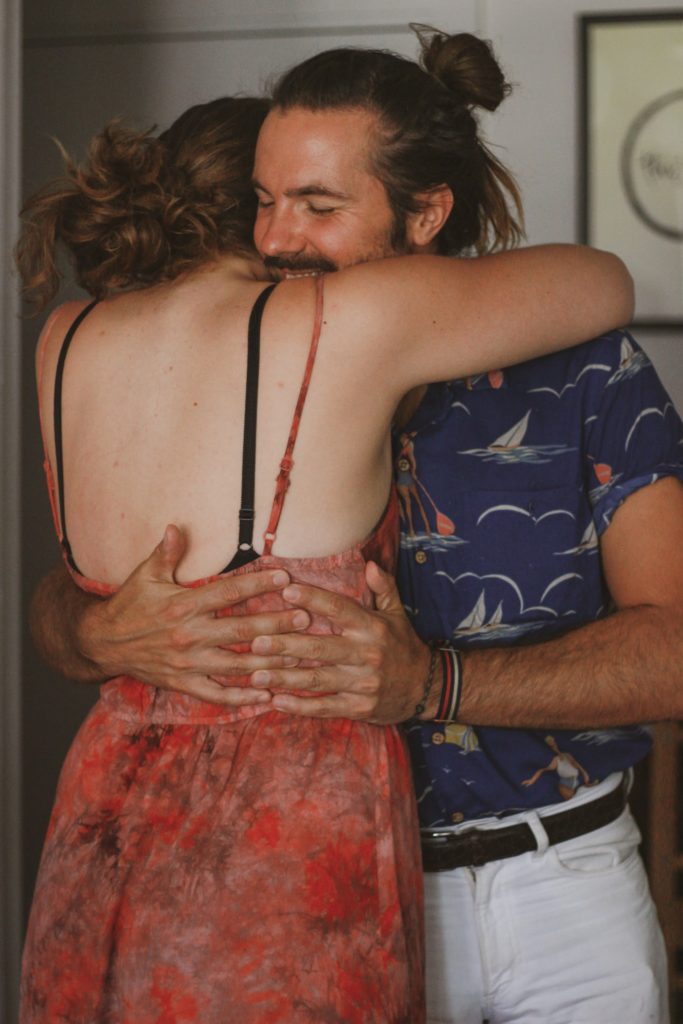
Jillian & Dennis.
To listen to this episode:
Lila: The fact that he didn’t respond, after that… really hurts my feelings.
Jillian: That makes sense.
Lila: (sigh) But. That doesn’t mean that I have any claim over him whatsoever. And if, he treated you well and you wanted to go on a date with him, then there really shouldn’t be any reason for me to— hinder that, do you know what I mean? Like, ideologically, theoretically, I don’t wanna st— I don’t want to be a person who stands in the way of love; I don’t want to be a person who stands in the way of connection. And so, I find myself at odds, sometimes with that, right? Because I feel the resonance of… the girl crying because you asked the boy that she liked to the dance. But you had every right to do so! She also could’ve asked him. Then it would’ve been a competition. That’s also very painful, and I have been in competition — real and imagined — with women, my whole life, for male attention. And it feels… pretty terrible.
***
Dennis: When you shared the attachment styles, my, my first thought was like, you know, this repulsion for the, the more anxious attachment styles like, you need to demonstrate to me that we are friends constantly. I’m like, cool, I’ll do that so long as it’s convenient, but please don’t read into me not reaching out as we’re not friends anymore. […] And I similarly have had conversations with friends when— whenever they make a comment like, “Oh, you don’t have time for your old friends anymore?”
Jillian: (strongly) Ss— ohhhh boyyy.
Dennis: Or using guilt or shame… it’s one of the few things that I respond really aggressively to.
Jillian: It’s true.
Dennis: And I will completely turn on them and be like, (actually very calmly) “I don’t appreciate you speaking to me like that; noone gets to talk to me like that. Like… guilt and shame and emotional manipulation are not a thing that I stand for and are not demonstrable qualities I’m looking for in a friend, so like—
Jillian: Yeah.
Dennis: If you would like to talk, I am open to it. And we could try again later. ‘Cause I didn’t grow up with guilt or shame. Like my mom never used that.
Lila: Wow.
Jillian: (laughs) Yeah it’s like, whoa.
Dennis: (overlapping) And I’m speaking hyperbolically. […] I’m saying like, never, because I recall distinctly two times where my mom even caught herself saying “should,” or “you should,” and then was even like, “Nope! Actually, I take that back.” And when I hear my grandma’s conversations that are so heavy with: “You should do this,” and it’s such a— using the term, “It’s such a shame,” constantly.
Jillian: Wuuf.
Dennis: It’s like, “Oh it’s such a shame that this happened!” And “You should be—” My grandma, I will almost say that like, 30% of our conversations are in telling us how we should live and what should happen, or the shames that she encounters in life— that my mom had such a response to it that she made this early commitment, and she’s an early childhood psychologist, and wrote the curricula for a lot of pre-schools for New Jersey. So she was like, “Nope! Not gonna take that approach with my kids.” And she had this conversation that— like still brings tears to my eyes when I think about that at 17 she was telling me how, “Next year, so one year from now,” this is as I was getting my license and we were having the, the curfew negotiation, and we were navigating what boundaries we were establishing as a family and she even said, “Next year, you’re gonna be 18. And I hope that the past 17 years have demonstrated that… I can be a friend, as much a— and like a partner, as much as a parent, and that I hope that you choose to spend time with me. Because you could walk out at 18 and never come back, and I really hope that you are interested in spending time with me afterward.
Lila: Mmmph!
Jillian: Oh my God! … Wow.
***
Jillian: I had a conversation with a friend recently where he was like, “Jillian, are you gonna try and create spaces that are like the spaces you talk about in your book?” And I’m like, to be fair? It is a super idealistic thing that I’m talking about, and of course, I just wanna vision the future that I want to see. But also like, right now it’s very unrealistic for a space to be all of the things that I say in my book. Like, it is modeled after the good parts of organized religion. And so like, in all the communities I’m in, there’s not eldership, like there’s not… except, I recently started going to actual church again for this reason, because there’s not… there’s no kind of like, path of teaching. Like the dances that I go to are freeform dances, like there’s not advancement, there’s not lessons, it’s just kinda like do your thing. There’s no like (laughing) elder dancers there to guide the way.
Lila: When I recommended your book and Tracey Anne Duncan bought it— she’s a really badass, writer, yoga teacher, queer person, in New Orleans. And she said, I’m reading this. Does anybody I know have a community as she describes in this book with these four points? […] I read all the comments, and I also asked that question myself later, and the only people who responded that they did, have a community that checked off all of those boxes, were people who were in 12-step groups.
Jillian: Yeah! That’s— the woman I was talking to today— I had a conversation with a nun, and, she was saying that the church did not save her, but her 12-step Overeaters Anonymous group did.
Lila: So where is the 12-step group for people who do not have addiction?
***
Dennis: Get Down feels like tribe for me— and I even just wanna— I use that term as like: to think in the traditional sense, that there’s a tribe, and we all speak the same language, and we probably have the same customs, and we generally will understand one another, and we could generally reach out, like we could be friends, you could reach out to anyone in your tribe and go, Hey tribemate, wanna chat about this thing? Or I see that you’re interested in this thing, wanna do it together? […] Smaller than that I still imagine there’s a village. Or there’s a community— there’s the people that come together from that tribe. Then even smaller than that is, what we would call our families, or our chosen families, and those are the… like, those are my squad, is also what I call it. And for there, I know that I’m missed.
Hello my patron.
This is the final installment of my four-episode arc with Jillian, anti-loneliness crusader, creator of The Joy List, author of Unlonely Planet & Dennis, Lifestyle Designer, Event Curator, and co-lead of Personal Development Nerds, her housemate, her chosen family, her brother.
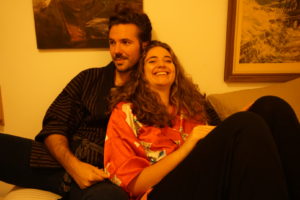
Dennis & Jillian, horizontal at home in Williamsburg, Brooklyn. October 2019
In part one, episode 98. withhelds & unsaids, Jillian and I cleared the air, I shared how I feel about Dennis, and we talked about attraction, The Touch Gauntlet, safeporting, and distinguishing between sensual and sexual energy.
Then, I made an erotic confession.
It gave me a vulnerability hangover that has gotten worse with time.
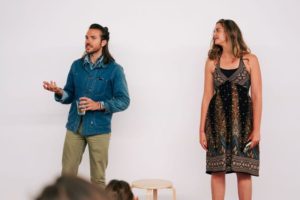
Dennis E. Sarkozy & Jillian Richardson present…
In part two, episode 99. indiana jones is my father, we discussed Dennis’s creative family tree, his matriarch of a mother, grade school crushes, and passing the torch.
Jillian and I grappled with my intentions for making our clearing part of the first episode, our public images, and deliberately revealing what we are actively struggling with.
Then Jillian told the story of how she induced her parents to attend a weeklong family therapy retreat.
The more I think about my parents, the more I am in awe of that.
In part three, episode 101. do high school rules still apply —
I skipped a number, of course, because 100 was a MEGA-episode with 9 guests, including Jillian! which was recorded on the 2-year anniversary of the podcast back in May, and is titled the narcissist tried —
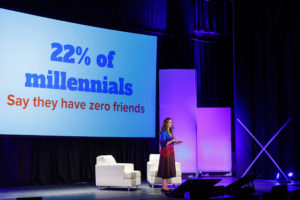
This is Jillian, giving a presentation at CMX.
We return to Jillian & Dennis in episode 101 and delve into Jillian’s household growing up, that incident with the vibrator, sexual debut versus “losing your virginity,” Dennis’s high school work as a peer-to-peer Sex Educator, his biological brothers, our early friendship lives, a fateful Sadie Hawkins dance, whatever happened to my lover Michael, and how Dennis used to rely entirely on his long-term relationship to get his intimacy needs met.
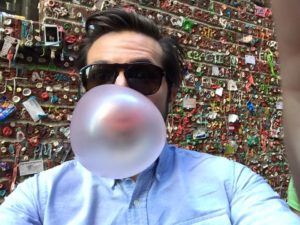 In this, the part four conclusion, we discuss:
In this, the part four conclusion, we discuss:
* Jillian’s friend breakup
* guilting & obligation
* emotional aperture
* squads and tribes
* the dance of erotic tension
* my estranged friendship
* how Dennis & Jillian met
* their apartment, “The Cuddle Castle”
* and the tribes that keep us in New York
Then I tell the story of the end of my last romantic relationship and Dennis tells the tale of the as-yet-unrealized ENFJ friend commune.
This episode was mixed and mastered by Irving Gadhoury, IGrecording.com on the interwebz. My cover art was illustrated by Shana Shay, whom you can find on 99designs. This remix of my original intro music was created by kidmental, an accapella beatbox musician. You can snag a theme song of your very own by becoming his patron on patreon.com/kidmental
Stay tuned after the outro for the story of how Dennis met his biological father. We night owls kept Jillian up too late for coherent storytelling, so Dennis told two stories!
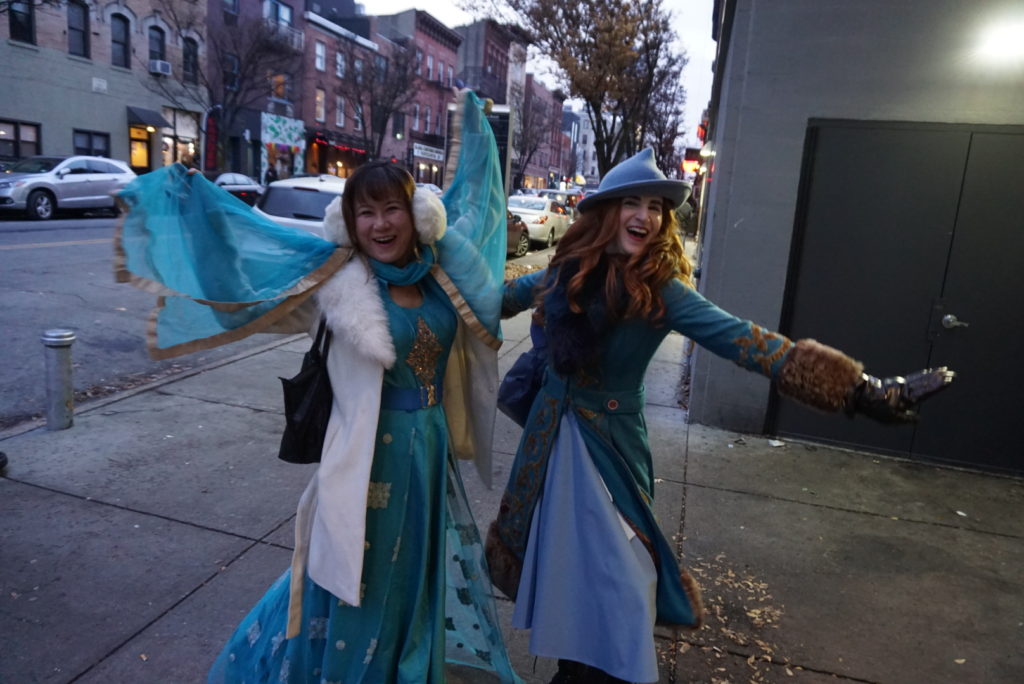
A good day for a little magic, I say! Elaine & I in Williamsburg, Brooklyn. December 2019
Until next week, I wish you:
someone to love…
something to do…
and something to look forward to.
I’m looking forward to seeing Frozen 2 with Elaine, my world-traveling, sea-turtle-loving, biochemist housemate, of episodes 9. it’s my body to give, and 10. his fingers are always hard.
Now, come lie down with us one more time in Williamsburg, Brooklyn.
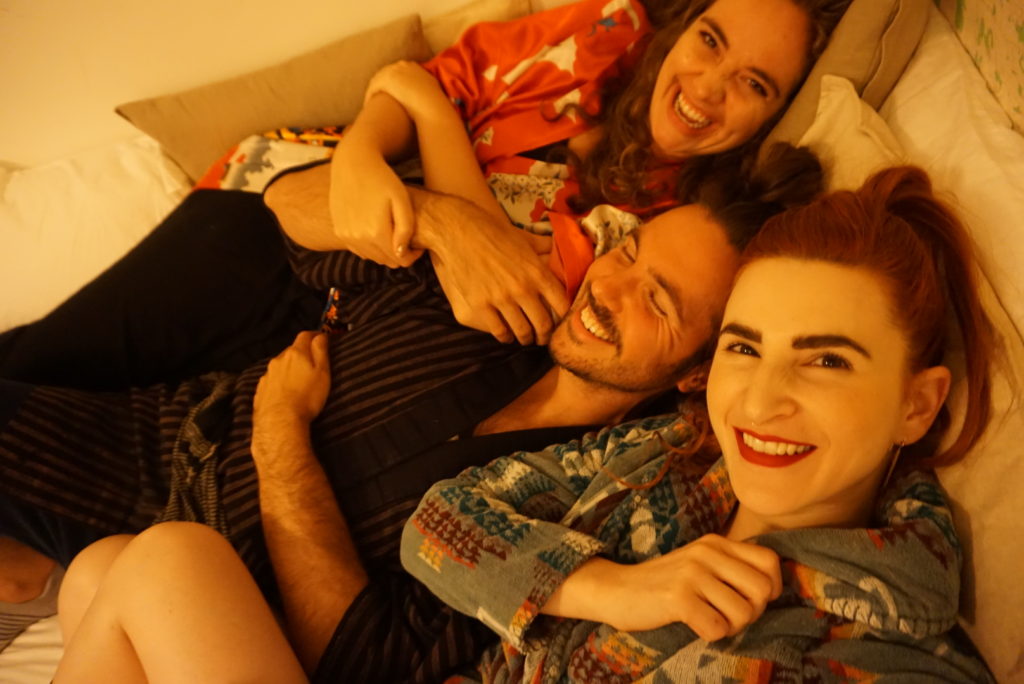
horizontal with Jillian & Dennis before recording this episode. Williamsburg, Brooklyn. October. 2019
To listen to this episode:
